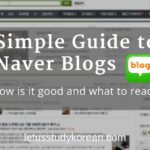~았/었더니 (~at/eot-deo-ni) – I (personally) did something before and therefore this happened (to me/another subject)
This looks quite similar to [Grammar] ~더니 but they are in fact very different. It’s extremely confusing at first but once you lay out the differences, it will be much clearer.
And no, the difference does NOT lie in the fact that ~더니 is present tense and ~았/었더니 is past tense.
Both grammar particles are used to describe a past situation/fact and the result that the speaker/writer personally experienced.
The following are 3 important properties to know about ~았/었더니 (very different from ~더니’s properties):
1. Cannot be used to express a contrast
2. Commonly used with first person subjects in the first clause
3. The second clause can refer to a different subject; if a subject is not specified in the second clause, it will refer to the first person subject in the first clause
(i.e. the whole sentence will refer to only the first person subject)
Examples:
작년에 저는 열심히 공부했더니 성적이 너무 잘 나왔어요.
I (personally) studied hard last year and therefore my grades were really good.
어제 공원으로 갔더니 사람들이 아주 많았어요.
I (personally) went to the park yesterday and (therefore I saw that) there were many people.
지난 주에 친구를 만났더니 그가 말했잖아요.
I (personally) met my friend last week and (therefore) he already told me.
나는 도움을 주었더니 동생이 고맙다고 했어.
I (personally) gave help and (therefore) my younger sibling said thank you (to me).




